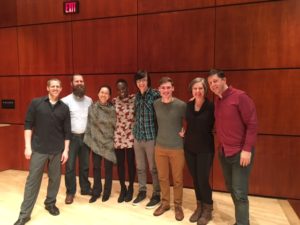When I was an undergraduate student, I won a prize that got me a reading session with the school orchestra.
I showed up for the session and discovered that one of the professors had decided to use the time to get a reading of a piece he had written. I got five minutes at the end of the session. The orchestra got through the first 20 measures of my piece, a work I had spent the better part of a year on.
I mentioned last week that we had eighth blackbird doing a recording session of some of our students’ compositions. I’m going to say a few things here that will sound like bragging, and maybe they are. I’ve been teaching Composition at the UNC School of the Arts for over twenty years, and I’ve gradually been able to shape the program to serve the students in ways that would have been unimaginable when I was in their shoes. More programs operate in this manner these days, but at many schools the professors still come first: composition teachers use their influence and school resources to get their own music performed and let the students fend for themselves.
Studying composition can be a near-sighted experience. You spend so much time thinking about all the things that go into a piece of music, it’s easy to lose touch with what comes out. The best way to overcome that myopia is to have your music performed and performed frequently. There is nothing quite like the experience of sitting in an audience and realizing that many of the concepts you felt were central to the way your music worked are inconsequential in the act of listening.
So, last week, we had eighth blackbird here and they recorded Zachary Mackey’s Interruptions and Alexander Umfleet’s Nivyrum. Here’s what’s happening the rest of this term:
Feb. 1: UNCSA Wind Ensemble premieres Nicholas Karr’s Ripple and Zachary Mackey’s Ontology.
Feb. 4: UNCSA String Orchestra premieres Alicia Bachorik’s Tango, Kendra Bragg Harding’s Asterisms and Peyton Clifford’s This Feels Like the End.
Feb. 11: Alexander Umfleet has his senior recital, with performances of Sunder, Ira, Noi, Schism and a new work for organ.
Feb. 18: Faculty clarinetist Oskar Espina-Ruiz premieres Algernon Robinson’s Tableaux on his recital.
Feb. 19: The Daedalus String Quartet comes for a recording session of Derek Arnold’s Venus and Adonis, Alicia Bachorik’s Seared Valor, Nia Franklin’s Burgundy in Autumn, Oliver Glynn’s From Cliff to Crest and Mason Johnston’s Live from the Ears.
March 18: The Winston-Salem Symphony premieres Derek Arnold’s The HMS Victory Under Full Sail.
March 25: UNCSA Wind Ensemble premieres a new work by Zachary Mackey.
March 26: Kendra Bragg Harding has her graduate recital, with performances of Asterisms, Autumn Leaves, I Shall Wear Midnight, Three Pieces for Piano, Inis Mor, Lullaby and selections from Shadowlands.
March 29: Student chamber ensembles premiere Jessica Buford’s A Pair, Peyton Clifford’s Nocturne for My Country, Algernon Robinson’s Rhapsody and Scott Shea’s Wind Quintet.
April 1: UNCSA Flute Ensemble premieres Alicia Bachorik’s A Visit to the Asylum and Thomas Little’s I Want To See You in the Summer.
April 11: UNCSA Percussion Ensemble premieres a new work by Alexander Umfleet.
April 25: UNCSA Symphony Orchestra performs Kyrie Antoinette’s Charybdia, Derek Arnold’s The HMS Victory Under Full Sail, Nia Franklin’s Europa, Thomas Little’s Grand Teton and Thomas McMillan’s Tin in It.
Working with their peers, working with professionals. Last year our 18 Composition majors had 88 performances of their music, from solos to full orchestra, all organized fully or in part by their teachers. Each one required extensive negotiation: we not only have to ensure that our composers get to hear their work, we have to make sure that the performers – at least when they are students — are getting full educational value from the experience as well. It’s a lot of work, but hey — a lot of work is worth it when you are living the dream.
For the record, I had a terrific education: I’m not out to blast any element of it. Those were different times, and I was learning how rare it was for young composers to get performances of their music. It’s not so rare nowadays, though – in some ways, in a more visually oriented era it’s easier for young composers than for older ones – so I can focus on teaching my students how to write music, as opposed to teaching them to accept a world where nobody is interested in what they do – they will get plenty of opportunities to bang their heads against that wall, fairly and unfairly, once they are finished here.

